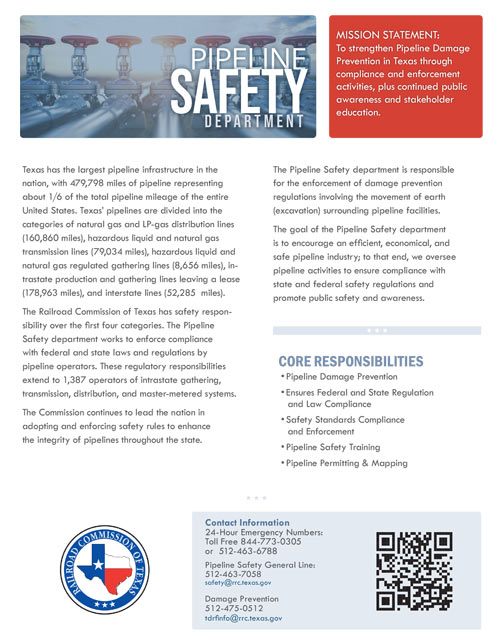
Texas Pipeline Damage Prevention Statistics
Pipeline Safety ANNOUNCEMENTS
Railroad Commission Seeks Input on Monthly Summary of Texas Natural Gas
June 18, 2025
To better serve the public, the Railroad Commission of Texas is seeking input from users of the Monthly Summary of Texas Natural Gas as the agency considers potential changes to the report’s content, structure and format. If you are a user of the Monthly Summary of Texas Natural Gas, the Commission is interested in hearing from you.
The Monthly Summary of Texas Natural Gas is on the RRC website at https://www.rrc.texas.gov/oil-and-gas/research-and-statistics/production-data/monthly-summary-of-texas-natural-gas/. This report contains 13 tables of data on natural gas production, disposition, natural gas liquids production, gas storage and other information in statewide and district summaries.
Much of the information used to compile the Monthly Summary of Texas Natural Gas comes from more than 2,000 Form R-3’s, Monthly Report for Gas Processing Plants, that are filed each month. The Commission is currently developing a new system to process Form R-3, and this is an ideal time to consider potential changes to the Monthly Summary of Texas Natural Gas.
The Commission requests interested users of this report to submit written comments, suggestions or recommendations on the report’s content, structure and format, and how this report can be improved. After a 30-day comment period, the Commission will hold a workshop or a webinar to discuss the findings and assess the future of the report.
Please send your comments, contact information (if you want to be informed of a workshop or webinar) or questions by email to: EngUnit@rrc.texas.gov, or by mail to:
Engineering Unit
Railroad Commission of Texas
P.O. Box 12967
Austin, Texas 78711-2967
The deadline for feedback is 5 p.m. on July 18, 2025.
What we do
The Oversight and Safety Division has responsibility for Alternative Fuels, Gas Services and Pipeline Safety. This reorganization in January 2015 will bring even greater efficiency and consistency to these operations within the Railroad Commission of Texas (RRC), allowing the agency to better serve the state.
Texas has the largest pipeline infrastructure in the nation, representing about 1/6 of the total pipeline mileage of the entire United States. Texas’ pipelines are divided into the categories of natural gas and LP-gas distribution lines, hazardous liquid and natural gas transmission lines, hazardous liquid and natural gas regulated gathering lines, intrastate production and gathering lines leaving a lease, and interstate lines. The RRC has safety responsibility over the first four categories.
Pipelines that cross between states are considered Interstate and would be under the jurisdiction of the U.S. Dept. of Transportation (DOT) - Pipeline and Hazardous Materials Safety Administration (PHMSA). The PHMSA southwest regional office located in Houston covers Arkansas, Louisiana, New Mexico, Oklahoma, and Texas.
The Pipeline Safety department works to enforce compliance with federal and state laws and regulations by pipeline operators. These regulatory responsibilities extend to operators of intrastate gathering, transmission, distribution, and master-metered systems. The RRC continues to lead the nation in adopting and enforcing safety rules to enhance the integrity of pipelines throughout the state.
Pipeline Safety rules administered by the RRC are adopted in the Texas Administrative Code, containing State specific requirements and incorporates by reference the minimum Federal safety standards for transportation of gas and hazardous liquids by pipeline and liquefied natural gas facilities.
The RRC also promotes and enforces an underground pipeline damage prevention program for Texas. The Pipeline Safety department is responsible for the enforcement of damage prevention regulations involving the movement of earth (excavation) surrounding pipeline facilities.
The goal of the Pipeline Safety department is to encourage an efficient, economical, and safe pipeline industry; to that end, we oversee pipeline activities to ensure compliance with state and federal safety regulations and promote public safety and awareness.







